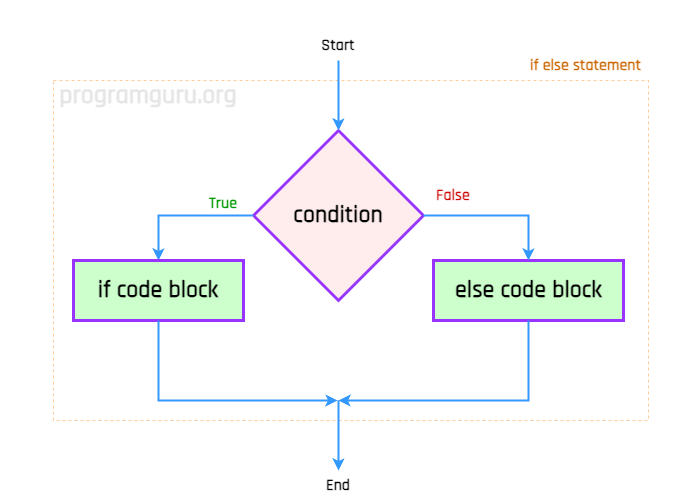If-Else Statement in Go
In this tutorial, we will learn about if-else statements in Go. We will cover the basics of conditional execution using if-else statements.
What is an If-Else statement
An if-else statement is a conditional statement that executes one block of code if a specified condition is true, and another block of code if the condition is false.
Syntax
The syntax for the if-else statement in Go is:
if condition {
// Code block to execute if condition is true
} else {
// Code block to execute if condition is false
}The if-else statement evaluates the specified condition. If the condition is true, the code block inside the if statement is executed; otherwise, the code block inside the else statement is executed.

Example 1: Checking if a Number is Even or Odd
- Declare an integer variable
num. - Assign a value to
num. - Use an if-else statement to check if
numis even or odd. - Print a message indicating whether
numis even or odd.
Go Program
package main
import "fmt"
func main() {
num := 10
if num % 2 == 0 {
fmt.Printf("%d is even.", num)
} else {
fmt.Printf("%d is odd.", num)
}
}Output
10 is even.
Example 2: Checking if a String Starts with a Specific Value
- Declare a string variable
str. - Assign a value to
str. - Use an if-else statement to check if
strstarts with a specific value. - Print a message indicating the result of the check.
Go Program
package main
import "fmt"
func main() {
str := "Hello, world!"
if str[:5] == "Hello" {
fmt.Println("String starts with 'Hello'.")
} else {
fmt.Println("String does not start with 'Hello'.")
}
}Output
String starts with 'Hello'.
Example 3: Checking if a Number is Positive or Negative
- Declare an integer variable
num. - Assign a value to
num. - Use an if-else statement to check if
numis positive or negative. - Print a message indicating whether
numis positive or negative.
Go Program
package main
import "fmt"
func main() {
num := -5
if num > 0 {
fmt.Printf("%d is positive.", num)
} else {
fmt.Printf("%d is negative or zero.", num)
}
}Output
-5 is negative or zero.